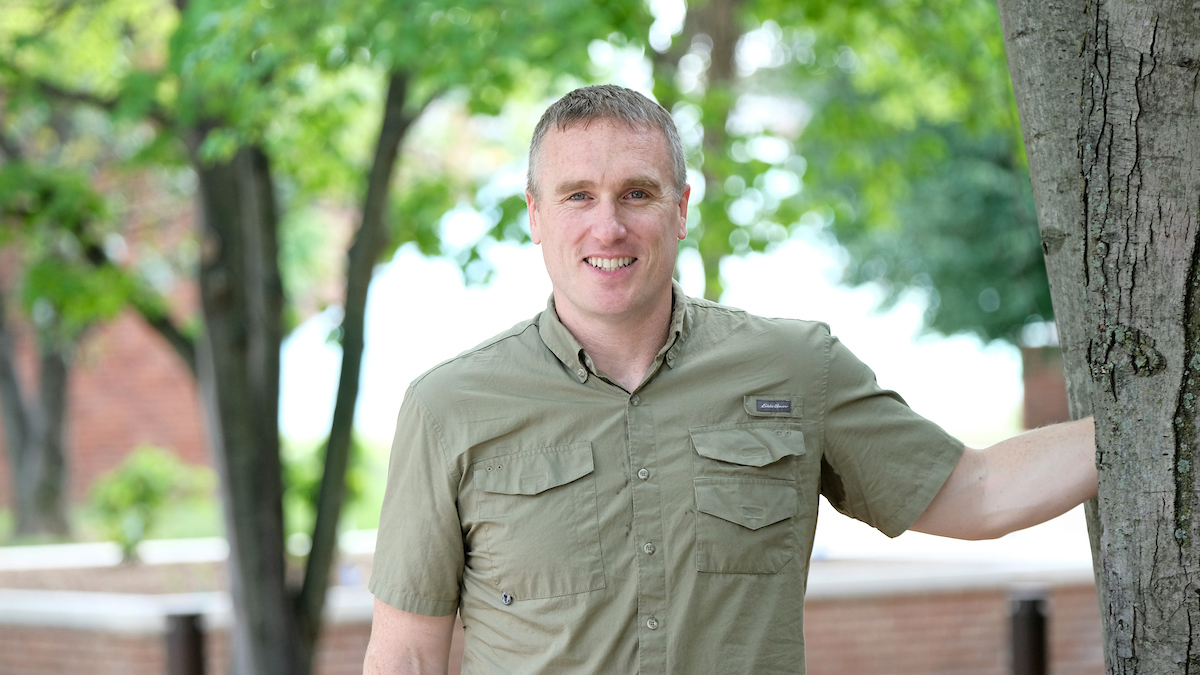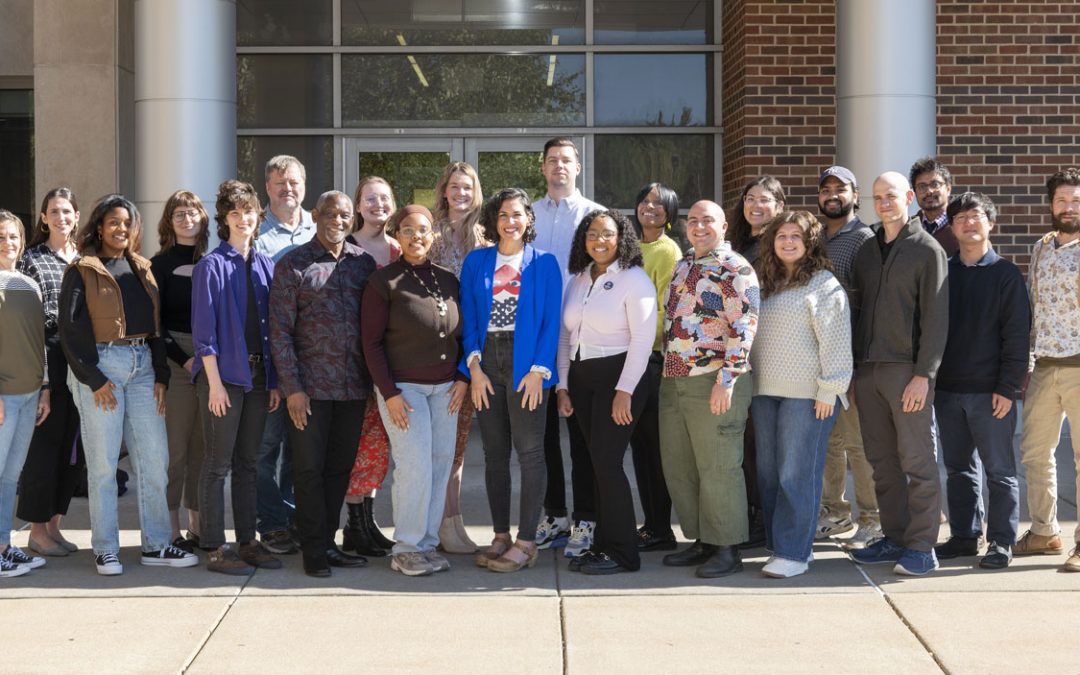
Thomas Baker was among the 60 students nationwide selected as 2018 Pat Tillman Scholars by the Pat Tillman Foundation. His is the third recipient from UMSL in the past three years and will receive nearly $45,000 over the next four years to support his work toward a PhD in criminology and criminal justice. (Photo by August Jennewein)
Thomas Baker was escaping his office and paying one of his regular visits to the Veterans Center at the University of Missouri–St. Louis to do some reading early last semester when he happened upon a presentation about the Pat Tillman Foundation’s Scholar Program.
It aims to select the “best-poised leaders, who show strength in character, academic excellence and incredible potential” and provide funding and networking opportunities that can help them apply lessons from life and the military “to impact our country for years to come in medicine, business, law, science, education and the arts.”
The PhD student in the Department of Criminology and Criminal Justice already knew about program’s existence before that day but hadn’t realized it was open to graduate students like himself.
Baker remained a little hesitant to apply, feeling uncertain he fit the right profile as someone who enlisted in the military right out of high school in 1996 and completed his service in 1999. He never had the experience of being overseas in a war zone like so many of the post-9/11 veterans he has encountered on campus during his time as an undergraduate and graduate student.
But Baker knew he had at least two things in common with Tillman: Each had served in the same unit in the U.S. Army and graduated from Arizona State University. Staff in the Veterans Center encouraged him to draft the required essay and submit the application.
“I heard someone say, ‘All service counts,’” Baker said.
It still came as a big surprise when the Tillman Foundation unveiled its 2018 crop of 60 Pat Tillman Scholars from the thousands of applicants – both military veterans and their spouses across the country, and he was one of them.
Baker is the only recipient this year attending a university in the state of Missouri, but he is the third UMSL student in three years to be recognized. He follows Ryan Barrett, a PhD candidate in political science, in 2016, and Heath McClung, an Army veteran studying in the UMSL/Washington University Joint Undergraduate Engineering Program, in 2017.
Baker was beyond grateful for the honor.
“It’s a huge opportunity – because of the financial pressure that it relieves, the opportunities it can facilitate and then the network and the name,” he said.
He will be awarded nearly $45,000 over four years to support his PhD work and research aimed at better understanding police use of force.
That’s a significant help to Baker and his wife, Denise, an assistant professor of psychological sciences at Missouri University of Science and Technology. They have two kids, including a daughter in college, and he left a nearly six-figure job as a police officer in Arizona when he decided to return to school.
“Some opportunities that I was interested in pursuing, some travel to do some observations for my research – it looks like now I can use this to support that,” he said. “So it will push my research a little further along.”
He sees opportunities for future collaboration by joining the network of scholars from different fields.
“My research is in policing, and in policing and military circles, this organization and Pat Tillman have a big name and reputation,” he said. “The legitimacy that comes with that organization, especially in those circles, is pretty neat.”
“I am excited to see Tom selected as a Tillman Scholar, but I can’t say I am surprised,” said Jim Craig, associate teaching professor and chair of UMSL’s Department of Military and Veterans Studies. “Not only is he abundantly qualified and is his research important, he is indicative of the caliber of the student-veterans at UMSL. Our student-veterans are thoughtful, worldly and they bring a drive for success that puts most of them at the top of their classes. Clearly the Tillman Foundation agrees with my assessment because they have selected UMSL students as Tillman Scholars for the past 3 years in a row.”
Baker is pursuing his degree and conducting his research at a time when the issue of police use of force is prominent in the national consciousness.
He brings a unique perspective because of his own experiences.
After completing his military service in 1999, Baker began taking college classes at North Carolina State University and had thoughts of trying to pursue a career in the U.S. Department of State. That inspired his decision to go to China in the early 2000s to study Mandarin.
It was also a motivator when he returned to the United States and joined the police force after settling in Arizona.
“I’d been told by someone in the State department that dealing with crisis management would be useful tools to have in the application process,” he said. “So I thought I’d be a cop for a year or two – that it might be something I’d be interested in and something that would be a good experience.”
He was still on the force almost a decade later.
Had Baker stuck around another 10 years, he’d have been able to retire with a good pension.
But his actions in self-defense in an officer-involved shooting incident that occurred while responding to a domestic violence call in 2009 were one factor in his decision to pursue another career path.
“It was an important moment in my life,” he said. “It was something that influenced me leaving policing. It was something that made me want to make a transition.”
When he ultimately left the police force in 2014, he completed two semesters of course work to finish his bachelor’s degree in political science and made the decision to pursue graduate work in criminology.
“I had an interest in the political and social implications of police use of force, and while I was considering leaving, police use of force was becoming a huge social issue,” Baker said. “I started learning a little bit about it, reading about it and just sort of felt a desire to take part.”
It was at the beginning of his graduate studies at Arizona State that Baker, at the suggestion of one of his advisers, read “Into the Kill Zone: A Cop’s Eye View of Deadly Force,” written by UMSL Professor David Klinger.
Baker reached out to Klinger in an email to compliment him on the book after finishing it, and a year later he enrolled in one of his UMSL courses on a continuing education basis after Denise accepted her job at Missouri S&T.
He applied to UMSL’s PhD program soon after and was accepted.
Klinger is overseeing his research.
“Right now, my focus is on the use of force at lower levels on the continuum, so people using force to control subjects and how those techniques can, if not properly executed or used in the right way, lead to higher levels of use of force,” Baker said. “People think, ‘Well, he or she is a police officer, they know how to fight, they know how to use force effectively and efficiently to control subjects,’ and that’s just not the case. The training for people to be able to effectively do that, I don’t feel is there. So what I’m interested in is what tools and techniques are available and how police officers are being trained in these techniques.
“I’m not sure where that will go.”
He is certain of his own long-range goal, which is to land a tenure-track faculty position after earning his PhD. He’s excited that when he does, he’ll be helping to bridge the civil-military divide he’s seen in his own experience in higher education.
“We have so many veterans on all of our campuses with these crazy experiences, but they don’t see their experiences reflected in the faculty,” Baker said. “I know there are academics with military experience, but it feels like it’s an underrepresented cohort given that we’ve been at war for a long, long time. I’m really drawn to filling that role as much as I can.”














